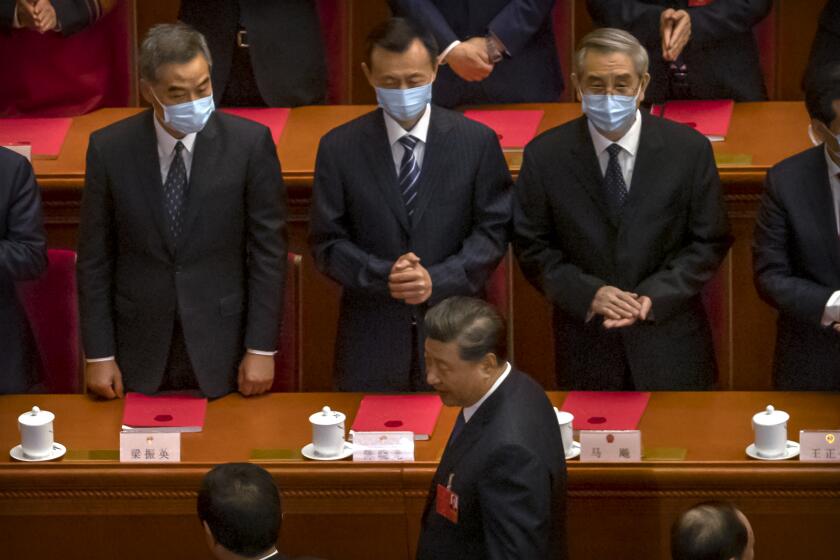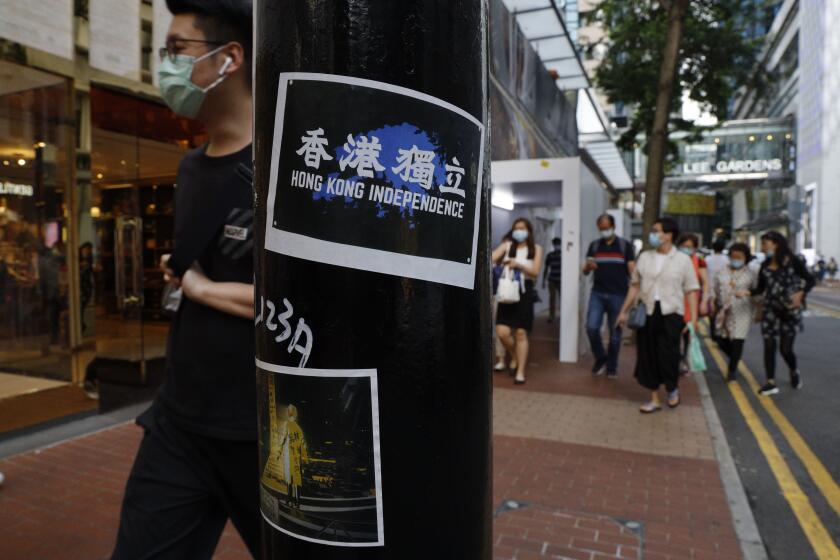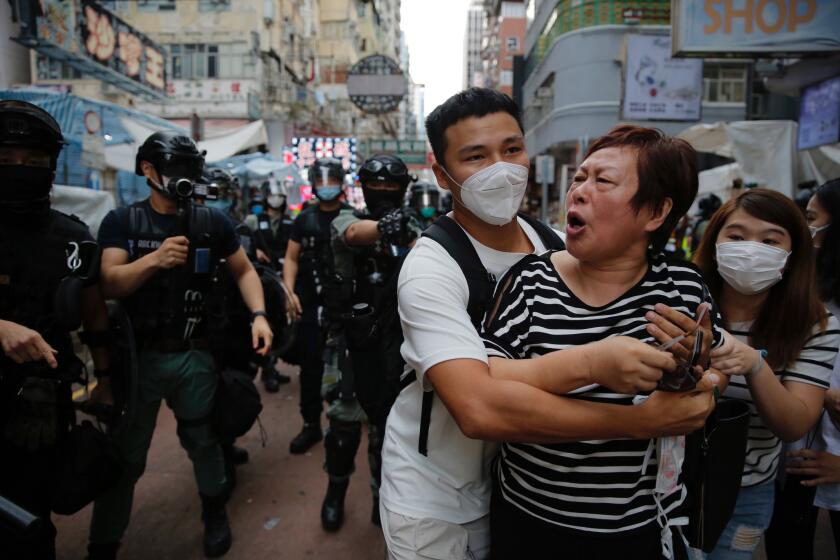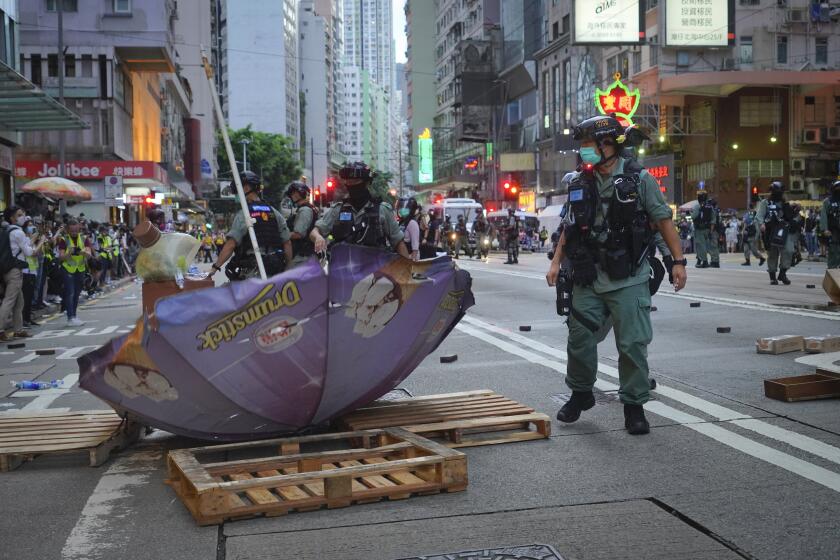Hong Kong police arrest media tycoon Jimmy Lai, raid newspaper in crackdown by Beijing
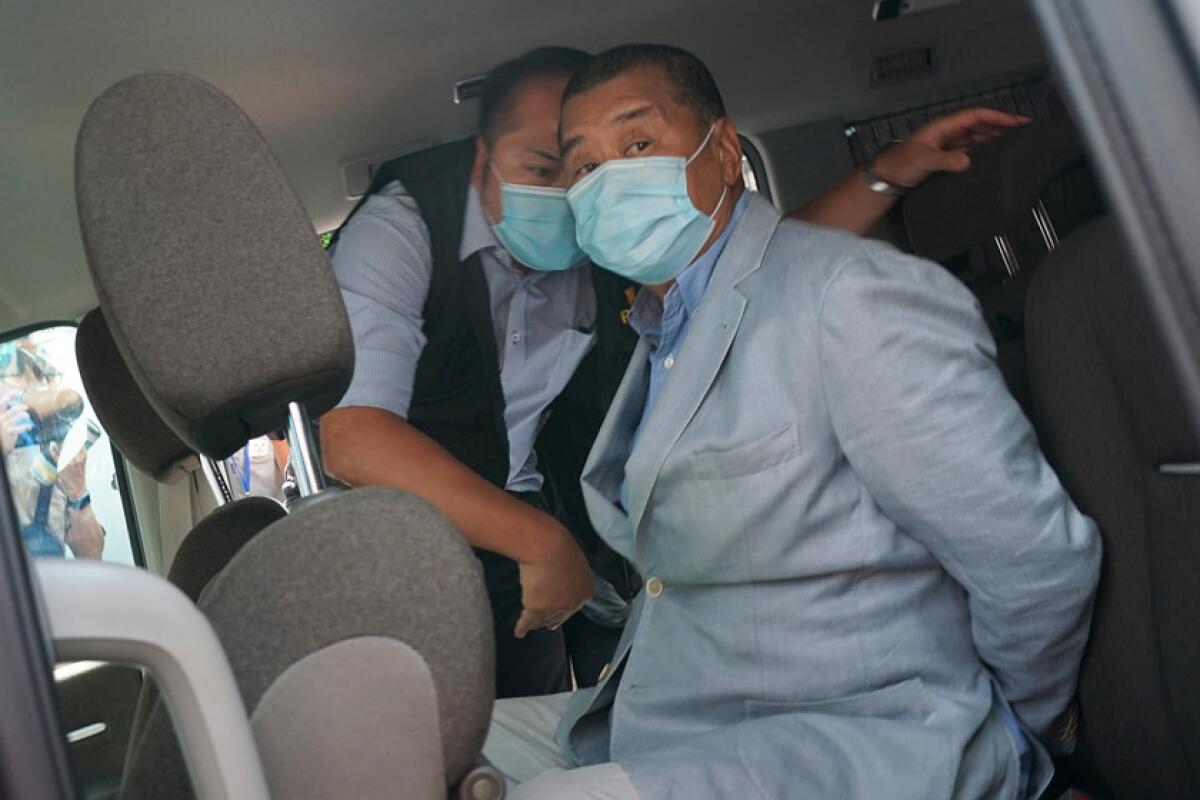
- Share via
SHANGHAI — Media tycoon Jimmy Lai, an outspoken supporter of Hong Kong’s pro-democracy protests, was arrested Monday along with his sons and several colleagues at the Apple Daily newspaper. It was a shocking assertion of China’s power over the city’s long-cherished media freedoms — and a chilling turning point for its independent journalists.
In a dramatic raid, more than 100 police officers swooped into the Apple Daily newsroom, cordoned off cubicles and rifled through papers on desks. Reporters were ordered to stand against a wall. “Stop filming!” an officer barked at one who continued to livestream the raid as it happened.
The arrest of Lai is the highest profile so far under a sweeping new national security law imposed by Beijing on semiautonomous Hong Kong. Lai, 71, was taken from his home with his sons and then marched through Apple Daily’s newsroom with his hands cuffed behind his back.
Outside, police barred several journalists for local and foreign outlets from getting near the building, reportedly saying that only those who had “cooperated with police operations in the past” would be allowed in. Even state-funded public broadcaster RTHK, which was recently forced to cancel a satirical program that poked fun at government policies, was blocked from entering the building.
“This is the stuff of authoritarian dictatorships,” said Keith Richburg, director of the Journalism and Media Studies Center at the University of Hong Kong. “This should give lie to the claims that the new national security law is all about protecting Hong Kong from external threats and would only target a tiny number of people.... This is a dark day for Hong Kong,”
Police said in a statement that as of Monday evening they had arrested 10 people, whose names were not disclosed, on suspicion of breaching the national security law with offenses including “collusion with a foreign country or external elements.” Along with Lai and his two sons, several senior executives at Next Digital, Apple Daily’s parent company, were arrested during the newsroom raid.
Less than two weeks under a new national security law enacted by Beijing, Hong Kong residents already feel a curtain of control falling over the city’s realms of speech and thought.
Also among the 10 arrested were a freelance videographer and two pro-democracy activists, including Agnes Chow, who was arrested at her home Monday evening, according to local news reports. Chow, 23, was a co-leader of Demosisto, a political party that grew out of the student groups at the vanguard of 2014’s pro-democracy Umbrella Movement. Demosisto disbanded hours after the national security law was passed.
Chow wrote online earlier Monday that several groups of what appeared to be officers in plainclothes had been following her and standing outside her house in shifts in recent days.
Inside the Apple Daily newsroom, the paper’s chief editor, Law Wai-kwong, confronted police, asking for their search warrant. They pushed him away. One officer pointed a finger in Law’s face, shouting that he could be arrested as well.
Many of Apple Daily’s reporters were working from home Monday morning and knew what was happening in their newsroom only by watching the livestream by one of their co-workers, said Alex Lam Wai-chung, a reporter at the paper and a spokesman for Next Media Trade Union, the staff union at Next Digital.
“It felt like an invading army approaching a castle,” he said.
Employees watched as hundreds of officers came out of cars surrounding their building, ignored their chief editor’s protests and went through the documents on their desks. The search warrant police eventually produced stated that they did not have the right to search journalistic materials, but they still did so, Lam said.
Police said they carted away 25 boxes of evidence.
Beijing’s bottom line is sovereignty. Hong Kong is a ‘purely internal affair that allows no foreign interference,’ Chinese government spokesman says.
The Foreign Correspondents’ Club of Hong Kong condemned Lai’s arrest and the raid, as well as the police force’s blocking of selected media outlets from coverage.
“If the police are allowed to decide who counts as a legitimate journalist, it will mark the end of press freedom in Hong Kong, and no critical coverage [will be] available to the public,” the club said in a statement. “Instead of the free flow of information, Hong Kong will have only propaganda.”
Meanwhile, another police squad searched and confiscated items from a restaurant belonging to one of Lai’s sons, ignoring questions from reporters as to whether they were national security police and had a warrant.
Also Monday morning, local news outlet the Standard reported that a new section had been quietly set up in Hong Kong’s immigration department to review foreign journalists’ visa applications. Foreign press have traditionally reported freely in Hong Kong, but several outlets have reportedly experienced unusual delays in receiving visas for correspondents in recent months.
Hong Kong’s controversial national security law is increasingly being used to stifle political dissent in the semi-autonomous city.
Lai has been vilified in Chinese state media as one of a new “Gang of Four” who supposedly colluded with the United States to foment the mass protests against police brutality and Beijing’s influence that have rocked Hong Kong since last summer. On Monday night, the Chinese government issued a statement applauding the arrests and calling Lai a “representative figure” of “anti-China, chaos-creating elements in Hong Kong that collude with foreign forces.”
Lai met with Vice President Mike Pence and Secretary of State Michael R. Pompeo last year to discuss a proposed extradition bill that initially sparked the protests. But there is no evidence that the U.S. government instigated or directed the protests, as Chinese officials have claimed.
Lai was arrested twice this year over his participation in unauthorized protests in 2019. He was additionally charged last week alongside young democracy activist Joshua Wong and more than 20 others for participating in a banned vigil June 4 to commemorate the 1989 Tiananmen Square massacre.
The national security law was passed June 30 and imposes a maximum punishment of life imprisonment for what it deems as secessionist, subversive or terrorist activity, or collusion with foreign forces. It is not supposed to apply retroactively, according to Hong Kong officials.
Hong Kongers are preparing for a new reality as China moves to impose new national security powers over Hong Kong that are seen by many as a “death knell” for the former British colony’s freedoms.
Hong Kong-based lawyer Antony Dapiran said the seeming retroactive application of the law to arrest Lai was “shocking,” as was the targeting of his sons and business associates.
“This hearkens back to the sort of classical imperial Chinese punishments which were given for one’s family members,” he said.
Dapiran said the arrest could be part of an escalating tit-for-tat between Beijing and Washington. Last week, the U.S. government announced sanctions against high-ranking Hong Kong and Chinese officials, including Hong Kong Chief Executive Carrie Lam.
On Monday, China’s Foreign Ministry announced that it would sanction 11 U.S. officials and leaders of human rights organizations, including Sens. Marco Rubio (R-Fla.) and Ted Cruz (R-Texas), in retaliation for the U.S. sanctions announced last week. Beijing had already slapped entry restrictions on several of the officials previously in retaliation for U.S. sanctions on Chinese officials over human rights abuses in Xinjiang in China’s northwest, where hundreds of thousands of Muslim Uighurs have been detained in camps.
Breaking News
Get breaking news, investigations, analysis and more signature journalism from the Los Angeles Times in your inbox.
You may occasionally receive promotional content from the Los Angeles Times.
President Trump also signed executive orders last week banning transactions with Chinese apps TikTok and WeChat. The U.S. and China have recently closed each other’s consulates in Houston and Chengdu and clashed over journalist and student visas, tech, trade, Xinjiang and the South China Sea.
Dapiran said the arrest could also be a distraction from U.S. Secretary of Health and Human Services Alex Azar’s arrival in Taiwan on Sunday, a move widely criticized by Beijing, which does not recognize Taiwan’s government and has blocked it from membership in the World Health Organization and other United Nations bodies. Azar is the most senior U.S. official to visit the island since Washington and Beijing established diplomatic ties 41 years ago.
Monday’s arrests and raid on Apple Daily were a step toward bringing Hong Kong’s press more in line with that of the mainland, where news media are tightly controlled by the Communist Party’s propaganda department. Chinese President Xi Jinping has told Chinese media that they should take “Party” as their “last name.”
Mainland journalists are also required to download and regularly score points on an app called “Study Xi, Strong Nation” that quizzes users on “Xi Jinping Thought.” The app has been proven able to access messages, photos, contacts and internet history, and activate audio recorders in Android users’ phones.
The Hong Kong government’s ban on demonstrations did little to stop thousands from testing a new national security law imposed by mainland China.
Lam, the Apple Daily reporter, was stunned by the police incursion into his newsroom.
“Nobody has seen anything like this in Hong Kong in the past 10 or 20 years. It was a large-scale raid by law enforcement on a news organization,” he said. “We think the police operation was meant to intimidate the media.”
Police had cordoned off part of the Apple Daily reporters’ working area, Lam said, but journalists were requesting access to reenter the building and continue their work. His colleagues outside the building were also reporting and writing.
“We have our responsibility to do what we do,” he said.
Next Digital, the newspaper’s parent company, issued a statement accusing the Beijing government of believing it could take Hong Kong “down the path of autocracy. Hong Kong’s press freedom is now hanging by a thread, but our staff will remain fully committed.... Apple Daily shall fight on.”
Su reported from Shanghai and Pierson from Singapore. Special correspondent Rachel Cheung in Hong Kong contributed to this report.
More to Read
Sign up for Essential California
The most important California stories and recommendations in your inbox every morning.
You may occasionally receive promotional content from the Los Angeles Times.
